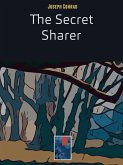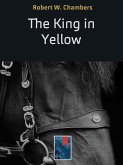A sharp clip-crop of iron-shod hoofs deadened and died away, and clouds of yellow dust drifted from under the cottonwoods out over the sage.
Jane Withersteen gazed down the wide purple slope with dreamy and troubled eyes. A rider had just left her and it was his message that held her thoughtful and almost sad, awaiting the churchmen who were coming to resent and attack her right to befriend a Gentile.
She wondered if the unrest and strife that had lately come to the little village of Cottonwoods was to involve her. And then she sighed, remembering that her father had founded this remotest border settlement of southern Utah and that he had left it to her. She owned all the ground and many of the cottages. Withersteen House was hers, and the great ranch, with its thousands of cattle, and the swiftest horses of the sage. To her belonged Amber Spring, the water which gave verdure and beauty to the village and made living possible on that wild purple upland waste. She could not escape being involved by whatever befell Cottonwoods.
That year, 1871, had marked a change which had been gradually coming in the lives of the peace-loving Mormons of the border. Glaze—Stone Bridge—Sterling, villages to the north, had risen against the invasion of Gentile settlers and the forays of rustlers. There had been opposition to the one and fighting with the other. And now Cottonwoods had begun to wake and bestir itself and grown hard.
Jane prayed that the tranquillity and sweetness of her life would not be permanently disrupted. She meant to do so much more for her people than she had done. She wanted the sleepy quiet pastoral days to last always. Trouble between the Mormons and the Gentiles of the community would make her unhappy. She was Mormon-born, and she was a friend to poor and unfortunate Gentiles. She wished only to go on doing good and being happy. And she thought of what that great ranch meant to her. She loved it all—the grove of cottonwoods, the old stone house, the amber-tinted water, and the droves of shaggy, dusty horses and mustangs, the sleek, clean-limbed, blooded racers, and the browsing herds of cattle and the lean, sun-browned riders of the sage.
Jane Withersteen gazed down the wide purple slope with dreamy and troubled eyes. A rider had just left her and it was his message that held her thoughtful and almost sad, awaiting the churchmen who were coming to resent and attack her right to befriend a Gentile.
She wondered if the unrest and strife that had lately come to the little village of Cottonwoods was to involve her. And then she sighed, remembering that her father had founded this remotest border settlement of southern Utah and that he had left it to her. She owned all the ground and many of the cottages. Withersteen House was hers, and the great ranch, with its thousands of cattle, and the swiftest horses of the sage. To her belonged Amber Spring, the water which gave verdure and beauty to the village and made living possible on that wild purple upland waste. She could not escape being involved by whatever befell Cottonwoods.
That year, 1871, had marked a change which had been gradually coming in the lives of the peace-loving Mormons of the border. Glaze—Stone Bridge—Sterling, villages to the north, had risen against the invasion of Gentile settlers and the forays of rustlers. There had been opposition to the one and fighting with the other. And now Cottonwoods had begun to wake and bestir itself and grown hard.
Jane prayed that the tranquillity and sweetness of her life would not be permanently disrupted. She meant to do so much more for her people than she had done. She wanted the sleepy quiet pastoral days to last always. Trouble between the Mormons and the Gentiles of the community would make her unhappy. She was Mormon-born, and she was a friend to poor and unfortunate Gentiles. She wished only to go on doing good and being happy. And she thought of what that great ranch meant to her. She loved it all—the grove of cottonwoods, the old stone house, the amber-tinted water, and the droves of shaggy, dusty horses and mustangs, the sleek, clean-limbed, blooded racers, and the browsing herds of cattle and the lean, sun-browned riders of the sage.









